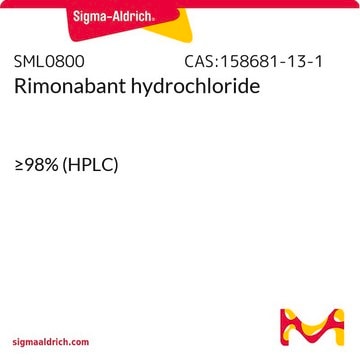M186
R(+)-Methanandamide
5 mg/mL in absolute ethanol, ≥96% (HPLC)
Synonym(s):
AM-356, R(+)-Arachidonyl-1′-hydroxy-2′-propylamide
About This Item
Recommended Products
Quality Level
Assay
≥96% (HPLC)
optical activity
[α]/D +8.7°, c = 4 in chloroform(lit.)
drug control
regulated under CDSA - not available from Sigma-Aldrich Canada
storage condition
desiccated
protect from light
under inert gas
concentration
5 mg/mL in absolute ethanol
storage temp.
−20°C
SMILES string
CCCCC\C=C/C\C=C/C\C=C/C\C=C/CCCC(=O)N[C@H](C)CO
InChI
1S/C23H39NO2/c1-3-4-5-6-7-8-9-10-11-12-13-14-15-16-17-18-19-20-23(26)24-22(2)21-25/h7-8,10-11,13-14,16-17,22,25H,3-6,9,12,15,18-21H2,1-2H3,(H,24,26)/b8-7-,11-10-,14-13-,17-16-/t22-/m1/s1
InChI key
SQKRUBZPTNJQEM-FQPARAGTSA-N
Gene Information
mouse ... Cnr1(12801) , Cnr2(12802)
rat ... Cnr1(25248)
Biochem/physiol Actions
Features and Benefits
Signal Word
Danger
Hazard Statements
Precautionary Statements
Hazard Classifications
Eye Irrit. 2 - Flam. Liq. 2
Storage Class Code
3 - Flammable liquids
WGK
WGK 2
Flash Point(F)
57.2 °F
Flash Point(C)
14 °C
Personal Protective Equipment
Certificates of Analysis (COA)
Search for Certificates of Analysis (COA) by entering the products Lot/Batch Number. Lot and Batch Numbers can be found on a product’s label following the words ‘Lot’ or ‘Batch’.
Already Own This Product?
Find documentation for the products that you have recently purchased in the Document Library.
Our team of scientists has experience in all areas of research including Life Science, Material Science, Chemical Synthesis, Chromatography, Analytical and many others.
Contact Technical Service










